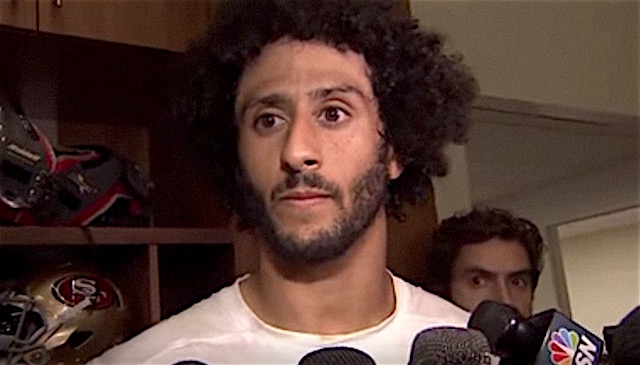What those who don’t like Colin Kaepernick don’t seem to get about America—and what they’re right on about.
I love football.
I became a Raiders fan when they won the Super Bowl in 1981. As the first born grandchild and not yet even a month old, my grandpa took it upon himself to place $200 on a hunch the Raiders would walk from the stadium soaked in Gatorade, trophy in hand. The seeds of my college fund were planted with his winnings.
It was the day “Rachel’s Raiders” became a household name—yes, America’s most stereotyped team had a blonde girl from Montana as a super fan.
And as much as I love the game, the culture is what I find fascinating. Often times, the individual drama of a player transcends the actual sport itself. Needless to say, the NFL is no stranger to controversy. Suicides, steroids, shootings, dog fighting, and spousal abuse have at one time or another spotlighted the disconnection and humanness of our most gifted athletes.
I watched closely on Sunday as teams around the nation linked arms and knelt in peaceful protest during our country’s national anthem. Their actions would once again transcend the game, but this time for a deeper, more intentional purpose. Their peaceful response to Trump’s ego-driven attack on the NFL, and more specifically, former San Francisco 49ers quarterback Colin Kaepernick, has our already divided country up in arms.
This issue is not one-dimensional, and in order to understand it, we have to put our own beliefs aside. According to Trump—and the people who support his impulsive rants—taking a potentially offensive opinion in this country now renders one unworthy of having a job. We seem to have forgotten that our right to express our views is what this country was founded on, as guaranteed by the First Amendment.
By working to silence and denigrate the decisions made by players and coaches, we are not only contradicting the very foundation of our freedom, but also giving power to bully tactics.
One argument is that these “entitled and privileged” men should just do their job and show respect—or be fired. But the last time I checked, being drafted into the NFL wasn’t something handed to the average athlete. These men worked for where they are. It’s their life. Attempting to undermine their First Amendment right in a sense objectifies them as nothing more than a well-toned body capable of catching a pigskin and performing sideline victory dances.
Sure, they have multi-million dollar contracts, but we’re forgetting that these men are of different races, come from different socio-economic backgrounds, practice different religions, and hold different views on politics. Most of them were not born with a silver spoon in their mouths. Colin Kaepernick, for example, was born to a single, teenage, white mother.
Ah yes, Kaepernick, the man made famous, not for his time in the NFL or his humanitarian work, but for kneeling during the national anthem in 2016 in response to police violence against minorities. This public act—a cry for social reform—quickly turned on him. People burned his jerseys and he received numerous death threats in response.
We need to keep in mind these players were not violently rioting in the streets with torches or angrily expressing hatred. They were not burning the flag, name calling, or sending death threats. Their battle has a purpose, and whether you agree with it or not, they’re peacefully using their highly-visible platform as professional athletes to say, “We’ve had enough.”
Their kneeling is not an act of defiance; rather, it’s a display of unity intended to call attention to the issues of injustice, racism, and the most sacred right of all—freedom of speech.
Publicly shaming a group of people for using their constitutional right in this way holds little value, if any. Jehovah’s Witnesses around the world chose not to say the Pledge of Allegiance. It happens every day. Why? Because it’s their right. If you were to ask any follower of that religion if their decision to not participate in the national anthem or saying the Pledge reflects their disdain or disrespect for our soldiers, their answer would undoubtably be no.
They are in no way intending to make a mockery of the flag (which was most likely made in China) or diminish the sacrifices of soldiers. In fact, several vets have rallied around the players in support of their decision to remain united, peaceful, and connected during a time of political and social unrest. And if you’re stuck believing players did not consider the sacrifices and reactions prior to making their decisions, that’s simply untrue. Devin McCourty, a safety for the New England Patriots elaborates:
“We hate that people will see it that we don’t respect our military, the men and women who are way braver than us that go and put their life on the line every day for us to have the right to play football. We know that people will see it that way and guys have family members, fathers, mothers, brothers, and sisters that serve, and they were really conflicted about it. But we just wanted to send a message of unity and being together.”
Yes, the national anthem is a symbol of culture that has long shaped people’s sense of national identity, but we should not be forced into patriotism if we no longer see the United States as “the land of the free” and truly feel our unity and democracy is at stake these days. We’ve become numb to the message behind our country’s anthem, but maybe the uproar over Sunday’s NFL events holds the promise of unearthing the issues that have surfaced again but show no signs of immediate resolve.
Awareness precedes change, and let’s be honest: we’re due for some. Hate, racism, and bullying are outdated; freedom never will be. It’s time to evolve and have honest conversations about what needs to be healed in our country. It’s time to push our egos aside and strive to understand the reasons behind the decisions others make before taking them personally or using bullying to elicit a response. Let’s work to internalize the reality that just because we’re offended, doesn’t mean we’re right.
We can protest in peace.
We can make an impact without violence.
We can love our country and still call out bullsh*t when we see it.
And this is why I have hope we will one day come together as one. Because, fellow Americans, we are.
Relephant:
~
~
Author: Rachel Dehler
Image: YouTube
Editor: Callie Rushton
Copy Editor: Danielle Beutell
Social Editor: Danielle Beutell


 Share on bsky
Share on bsky





Read 0 comments and reply